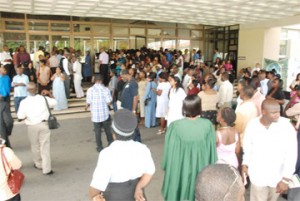As Guyana shifts economic focus to the exploration for petroleum products onshore and offshore, and the development of alternative sources of energy based on wind, solar, hydro and bio-fuels, a demand for a new raft of skills will be created that will require a more strategic collaboration with the University of Guyana, according to CEO of GT&T Major General (rtd) Joe Singh.

It is an evolving process of development, but it will depend on the extent to which the university as a social tool has resonance with government and the private sector, Singh said in a feature address to graduates at UG’s 42nd Convocation at the National Cultural Centre (NCC) yesterday.
A stable political and socio-economic environment will stimulate foreign direct investment in the productive and services sectors, and the sport and entertainment industry will also find opportunities to grow Singh affirmed, but pointed out that an enabling environment that encourages Guyanese to see a future in studying, working and establishing firm roots here must be created.
Of particular importance is influencing the foreign investor to establish viable economic partnerships that stimulate the economy, Singh said, adding that this will offer stable employment and challenge the public and private sector to work with institutions such as UG to produce the quality of education, expertise and research that would “ensure the development of an educated, committed and competent work force on a sustained basis.”
According to him, the country needs to seriously address deficiencies and anticipate the demand in its evolving process of development to catalogue the direction in which it needs to go with tertiary, vocational and technical education.
Singh said there are a string of issues that must be addressed, which require the requisite skills’ base to find practical solutions and realistic ways forward – issues that are inhibiting development, such as social inequalities, alcoholism, crimes of violence and narcotics-linked corruption and money laundering among others.
In a global financial environment that has created trauma, loss of confidence and a degree of hesitancy to act decisively, he said that Guyana has the opportunity to re-tool and re-energise its people and economy by exploiting fully the pursuit of projects and programmes linked to what he referred to as the three Fs – Food, Fuel and Forests.
He noted that food security is premised on producing what is required to satisfy the country’s nutritional needs. Singh said too, that the country needs to reduce over time its dependence on imported fuel and fossil fuels by developing alternative sources of energy without compromising food production.
Further, he added, even though there are justifiable concerns about the steady exodus of graduates and skilled persons from Guyana, training must continue; and he reiterated that government, the private sector and civil society have to collaborate to nurture an environment that motivates the skilled and professional cadres to want to remain to build Guyana.
Shonnette Fraser, a teacher and the second best graduating student from the Faculty of Education, stuck with the message delivered by Singh in her valedictory speech and emphasized the need for graduates of the university to stay and contribute to the country’s development. She charged that the time is ripe for them to assess what it is required of them as trained minds. She spoke in the absence of Best Graduating Student, Khafka Alexander, a St Lucian who is a Guyanese by marriage. Alexander earned a degree in Social Work and was reportedly absent because she is back in St Lucia.
Fraser said the entire graduating class represents a core of hardworking people who have sacrificed much and had put in the hours to achieve what they have. She charged them to be a positive image in the future, adding that they already possess the courage and strength. She recalled that her ascent to the top was a difficult one, and singled out her family and friends for their unwavering support.
In a speech that was heavy on quotes, Fraser said that like Martin Luther King Jnr she also has a dream to share.
“I have a dream that one day teachers in this country will be paid salaries that equal to or double that of our counterparts in the region and that teachers will be able to own their own homes and even transportation, and that they can get a part of their gratuity after 15 years of service,” she said to a thunderous applause.
She noted that the mass exodus of the nation’s educators needs to be checked, adding that it will happen when certain changes are made in the profession.
The shift to the NCC by the university’s administration was due to inclement weather, but the cultural centre proved too small a venue since many persons who turned up were left standing outside. Notably, many graduates failed to show.
For the first time in the history of the university, students who were trained in General Surgery graduated, and the audience paid deserving respects.





